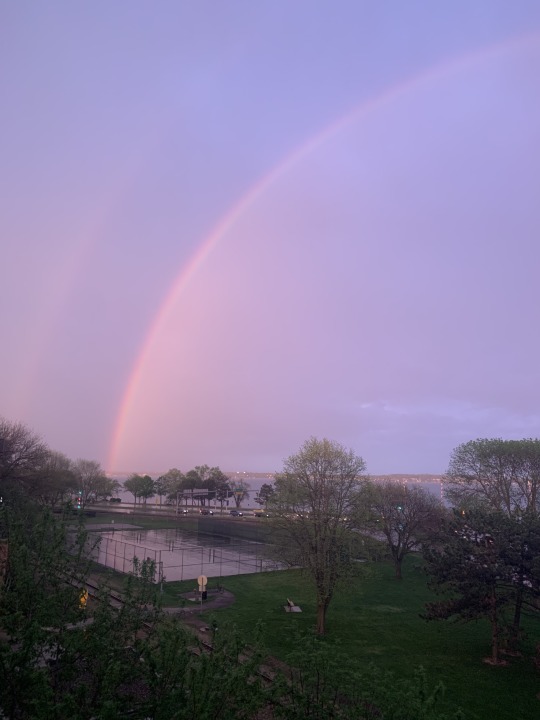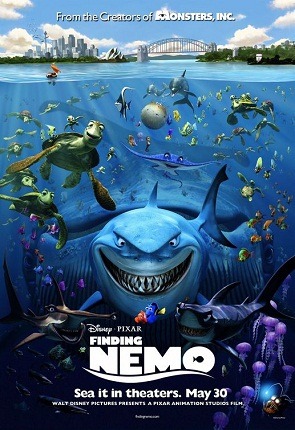#filtered through my choral memory
Text

Had I the heaven's embroidered cloths,
Enwrought with golden and silver light
The blue and the dim and the dark cloths
Of night and light and the half-light,
I would spread the cloths under your feet,
Your feet.
But I, being poor, have only my dreams.
I have spread my dreams under your feet;
Tread softly, tread softly,
For you tread on my dreams.
#theme:#on light#a loving complaint#Aedh wishes for the cloths of heaven#w.b. yeats#filtered through my choral memory
1 note
·
View note
Photo

The Story
The Story is about a clown fish looking for his son.
The creators claimed that they did a lot of research of the fishes in this film (even got qualifications on marine biology), but clearly they didn't put anything factually accurate in this film. The most noticeable one is at the beginning, with the barracuda (the fish that killed Choral. Barracudas DON'T eat eggs.
This isn't the only one, but a SIMPLE google search can give you all the answers you need.
Oh, and also....
GOLDFISH AREN'T MARINE FISH!
They are cold water (basically, the best place for them is a pond). Some people do keep them in tropical water, but this is looked down upon and is NEVER recommended by the fish-community. But no one in there right minds would put a goldfish in a FLIPPING marine tank!
The Story itself isn't original, it's just a generic road trip story without the humour or charm that some of the better ones have. In fact, the film seems to be VERY obsessed with toilet and poop jokes, and not the funny kind...
The Characters
None of the characters are memorable or interesting. They are all one dimensional. Marlin is the over protective father, Dory forgets (that is her only personality trait) and the son is just a rebellious kid.
In fact, the representation of fish keepers/owners is poorly made. As a fish owner myself (I have over 5 tropical tanks and a massive koi pond!) I am appalled at what this film says about the fish-keeping community.
I cannot say much about the Marine part of the community (in fact, there a minority), but what I can say is that we don't treat our fish like we do in this film. We don't have filters that can suck up fish (the actual suction tube only has TINY holes that only water can get through), we don't let children treat fish poorly (like let them tap the glass or shake the bag) and we CERTAINLY don't take them out of the Wild and put them in out tank. We have things called "pet shops"! I'm sure you're heard of them (the creators CERTAINLY haven't!).
I love fish, I truly do and I will not tolerate anyone saying that fish keepers are bad people who hate animals!
Anyway, that's enough of my rambling on that one. Let's get to the next category before I feed someone to my fish! (It's a joke! Don't take it literally!)
Another thing that bothers me is the the fish reference human things (such as balloons), yet they act clueless when the plot demands it. LAZY WRITING!
The Animation/Special Effects
The Animation looks alright. But they reused Animation repeatedly to the point even a first-time viewer can notice them!
The fish I must say actually look alright. Not perfect, but alright.
Final Thoughts
I know people like this movie because they saw it as a child, but rewatching it years later just makes me cringe. I'm not against people who like the film, but they need to notice that it isn't the best film out there.
In fact, many of the tropes in this film (I.e the "mine" gulls) feel like minions, with their silly catchphrase and how they EXPLODED in popularity. Nowadays, I don't see these gulls anymore. They were just a trend that got popular, just like this film.
Keep your memories of this film, just don't rewatch it today, okay?
The Story 1/5
The Characters 0.5/5
The Animation/Special Effects 3/5
Overall 2/5
#finding nemo#film#film review#movie#moview review#review#reviews#clown fish#goldfish#overrated#overrated films#bad#minions#inaccurate#propaganda#fish keeping
0 notes
Text

Every Record I Own - Day 640: Nordra PYLON III
This is another album highlight of 2020.
This is the bio I wrote for my friend Monika Khot’s third solo album under the name Nordra. Everything Khot touches is fantastic, and this album is no exception.
In the fleeting moments of downtime between her work with the primitive-futurist neo-psych outfit Zen Mother and her touring duties as a supplementary member of Daughters, Monika Khot creates apocalyptic dirges combining modern classical explorations of electronic ambience with hardware-fueled industrial barrages under the name Nordra. The project has taken her across North America and Europe, performing in both the high-brow art world and in the underground rock trenches on tours with artists like SUMAC and Algiers. Nordra’s third full-length continues her penchant for chilling digital drones, thunderous clatter, polyphonic idiosyncrasies, and a search for a harmonious balance between wrangling sounds out of new technology while exerting an undeniable human presence over the machinery. This final factor was of particular importance to choreographer / multi-media artist Colemxn Pester, who enlisted Khot to score their modernist dance performance trilogy PYLON, which explores the themes of resilience in the age of technology, surveillance, and other man-made impositions on the human body. Nordra’s second outing, the commissioned score for PYLON II, was a hard-edged martial exercise—fitting for the dystopian nature of the series’ second installment. But for PYLON III, Pester was looking for the light at the end of the tunnel and requested that Khot instill her work with hope and calm in order to serve the utopian aims of the performance.
Despite this direction, Nordra’s latest offering retains a certain tension and power present in her early work. “All of the writing techniques I intended to use remained in place, but I think the emotional resonance of this piece of music changed over the course time,” Khot reflects. “I don’t think this piece embodies utopia or the shedding of a corrupted society at all even though that’s what I set out to do… there's a dystopian destructive sound that I can't shake just yet.” That unwavering sense of foreboding is evident from the first note of the record, a massive square-wave pulse that ushers in “Prologue.” But the musical embodiment of hope follows close behind with sublime electronic drones that continuously push and pull the composition between major and minor keys. Digital hisses, the clatter of machinery, and the doomsday clock-tick of the hi-hat nudge the tone back into dire settings while swells of pocket trumpet and ethereal choral vocals struggle to provide solace. The duality of hope and despair was perhaps inevitable given the climate around PYLON III’s creation, with Khot dealing with a close friend’s cancer diagnosis and Pester’s performance preparations interrupted by technical setbacks and injured dancers.
It’s impossible to convey resilience without also capturing hardship, and the album’s second track “Remembering” excels at communicating a sense of calm while some vestige of danger percolates beneath the surface. Khot’s dreamy wordless-vocals sit at the forefront of the piece while stuttering percussion and groaning drones bubble up from below like buried memories. On “Monologue On The Beach,” Khot uses sporadic guitar harmonics, fractured piano melodies, and soothing digital hums in a manner that feels spontaneous, fluid, and human, effectively creating an underlying sense of peace amidst disorder. This dichotomy between chaos and calm was one of the shared themes between Pester and Khot’s work, and it manifested in a variety of ways on PYLON III. One of the most obvious examples occurs on “Searching In Fields For Elements,” where Khot filters digital noise through a MIDI note interpreter and inserts the resulting melody as a sequence of synthesized bell notes. “I wanted to create an actor that represented this industrialization so you could see if you found it endearing or not,” Khot explains. Our response to these random elements opens up a dialogue about the will of the element. “Some days I'm an anarcho-primitivist and some days I'm curious about what the exploration of machine-learning has actually taught us about our own consciousness,” she continues. The notion that technology could accelerate our journey towards enlightenment is perhaps the most utopian vision one could have in our current age.
Ultimately, the music of PYLON III provides one context as backdrop to Pester’s multi-media performance, but it has its own life and own character when absorbed on its own. In terms of emotional timbre, it’s a departure for Khot, even if the instrumentation and hardware tonalities are consistent with her self-titled debut LP and PYLON II. “I don't think I would write the music on this record with no context,” Khot says. “It is completely fueled, adapted, and created with thematic, visual, and choreographic content in mind.” And yet even without those components, the experience of listening to PYLON III is haunting, compelling, and ultimately redemptive.
4 notes
·
View notes
Text
FPJ Blog Post: “Change”
This summer I visited the northwest for two months, primarily to help my father build a house. My parents had left their beloved firstborn (me) in Texas whilst traversing the country during my first semester of undergrad, finally settling in Astoria, Oregon—home of Kindergarten Cop and The Goonies, both which are displayed proudly on an isolated shelf in the town’s very own VCR / DVD rental store. Having seen neither of these films, I was at a loss to understand the community’s prime hype.
So, without any peers in the area whatsoever, it was just me and my 34 pound suitcase of books. I set to work on such procrastinated novels as Catch-22, The Grapes of Wrath, and Dead Souls (from this list you might be able to infer that I felt desolately trapped in labor).

This geographical change rocked my mental equilibrium, to say the least. Replacing my morning novel with a hammer really nailed the point home that I wooden’t have much time nor energy for leisurely cogitations of philosophical type (but time enough for puns, always). Furthermore, in Oregon, remote and cut-off from the usual stimuli found in an adventurous young adult’s lifestyle (such as daring to buy groceries before checking bank balances and whatnot), my days blended into a blur of moderate temperature and sawdust—a stagnation subduing youthful frivolousness.
And then, I noticed my poetry appeared a tad stale. Though metaphors and alliteration still rippled stanzas like the nearby Columbia River, the content was bereft of connection to life. Instead of drawing from happenings and feelings actually present, I was purely fabricating circumstances with only surface meaning. I was lying lyrically.
Any dedicated individual keen on their passion ardently practices and perfects it in order to accustom the art into muscle memory; I had grown used to the catharsis of having an inner turmoil expressed and quelled through the act of writing, but what happens when you have nothing to expel? Do you conclude your run of ‘being an artist’ with the current lack of production? Does an artist need the validation of output in order to say, “yes, I made this, now I am a justified in my niche?”
Remembering when a professor of mine once deftly pointed at a line in an Anne Sexton poem to declare, “that’s BS”—meaning that the acclaimed poet’s voice was noticeably incongruent in its integrity—I panicked. Would my insincerity of verse likewise be this transparent?
The aforementioned professor had also once articulated a guide for eliciting more authenticity during writing processes: notice the contrast between what you may have to say (i.e., what pretty words may be stored in that visionary brain of yours) and what you HAVE to say (i.e., what must be let loose of its storage to be recognized, felt, made tangible).
Accordingly, I began to filter my thoughts before they materialized on the page. But I realized there was not anything that I did HAVE to say. And so, as I believe an emotional and bona fide fervor should be the undercurrent and movement of any writing which is expected to have a lasted influence on author and audience alike, I said nothing.
Thus, my decision to take a sabbatical from my daily writing was, effectually, a chance to breathe and experience moments without the bedeviling voice which nags how do I transcribe this? Though transition included side-effects of tingling extremities and tumultuous thoughts, I felt more at ease to merely read and absorb my surroundings, rather than rushing to put-out works and contributions of my own.
Meanwhile, in my hands was Jack Kerouac’s Lonesome Traveller, opened to chapter six: “Alone on a Mountaintop.” Already enamored with the Beat Generation of the 50’s and 60’s, I knew much comfort in this prolific author whose unsettled, dazzling unconsciousness, laid bare in his prose and poetry, inevitably sparks my latent juices into creativity time and again. And, like magic, I stumbled upon this:
“No man should go through life without once experiencing healthy, even bored solitude in the wilderness, finding himself depending solely on himself and thereby learning his true and hidden strength.”
Well, needless to note, I unhesitatingly stepped outside into the blooming breeze of foxglove and pine. Inhaled. Exhaled.
Closed off senses.

Unbeknownst to me before the spontaneous exploration of our overgrown backyard, there is a labyrinth of long trails covering miles of moist moss, fierce forest, and lush leafage. Taking the above excerpt to heart, I wandered about my “paths of solitude” for hours, practicing mindfulness for an erased mental slate. My attempt at being a lonesome traveller subsequently resulted in knotted-green hair and an unknotted, zen-like spirit.

Unfortunately, though penetrating deep enough to become so severely lost that law enforcement had to be notified on one outing, my trip ended before I was able to traverse the extent of all the routes. Currently back in San Marcos just weeks before the start of my Masters in Poetry program, I have been gradually reintroducing the art of composition into my daily habit—the difference being, now, that I acutely feel weight and import of what I record, having not recorded in so long.
Inertia, or the property of an object to stay in motion / rest until an external force coerces change, has both aided my abundant output before and stifled the beginnings of such. Learning how to take agency against the natural tendency to continue a uniform life is what will distinguish a person’s art by showcasing that intrinsic power. It is a deep power, to say, “no, I will commence, or cease, when I alone please.”
That being said, appreciating the exact moment being lived, instead of constantly waiting for future happenings, heightens one’s sense of self, being thus fully involved in the physical form of now and not in the ethereal shimmer of “sometime.”
I close with another Kerouac quote from the same passage:
“Yes, so to try to attain to Nirvana when you're already there, to attain to the top of a mountain when you're already there and only have to stay - thus, to stay in the Nirvana Bliss, is all I have to do, you have to do, no effort, no path really, no discipline but just to know that all is empty and awake, a Vision and a Movie in God's Universal Mind (Alaya-Vijnana) and to stay more or less wisely in that.- Because silence itself is the sound of diamonds which can cut through anything, the sound of Holy Emptiness, the sound of extinction and bliss, that graveyard silence which is like the silence of an infant's smile, the sound of eternity, of the blessedness surely to be believed, the sound of nothing-ever-happened-except-God.”
Do not worry, then, about change, for the mind and body have their ways of equalizing the chaos of natural occurrences. Some days have slots for your impact and voice, as a harmony awaiting your counterpart and choral idiosyncrasies. Some days are charged with a current which drags its suspect along a tremendous path, so that the latter may absorb and be humbled by a wildness that might be inadvertently shunned when we are inwardly centralized. Whatever the ebb or flow, learn how to feel where movement is naturally occurring, and, by stepping into that spring, bathe.
Emily Ellison is a MFA Creative Writing Candidate at Texas State University. As a poet, she revels in the art of word play, though her friends would rather her puns and double entendres not interrupt their dinner parties. Emily, currently working on several collections of verse, aspires to be a professor of English so that her years of bookish isolation will finally have paid off.

#catch22#grapesofwrath#family#change#movement#nature#oregon#books#bibliophile#writing#writingprocess#poetry#annesexton#authentic#original blog post#originalpost#jack kerouac
4 notes
·
View notes
Text
It was beautiful. It sounded like wild silk looks.
The subject of wizards and sex is a complicated one, but as has already been indicated it does, in essence, boil down to this: when it comes to wine, women and song, wizards are allowed to et drunk and croon as much as they like.
The reason given to young wizards was that the practice of magic is hard and demanding and incompatible with sticky and furtive activities. It was a lot more sensible, they were told, to stop worrying about that sort of thing and really get to grips with Woddeley’s Occult Primer instead. Funnily enough this didn’t seem to satisfy, and young wizards suspected that the real reason was that the rules were made by old wizards. With poor memories. They were quite wrong, although the real reason had long been forgotten: if wizards were allowed to go around breeding all the time, there was a risk of sourcery.
Of course, Rincewind had been around a bit and had seen a thing or two, and had thrown off his early training to such an extent that he was quite capable of spending hours at a time in a woman’s company without having to go off for a cold shower and a lie-down. But that voice would have made even a statue get down off its pedestal for a few brisk laps of the playing field and fifty press-ups. It was a voice that could make ‘Good morning’ sound like an invitation to bed.
The stranger threw back her hood and shook out her long hair. It was almost pure white. Since her skin was tanned golden the general effect was calculated to hit the male libido like a lead pipe.
Rincewind hesitated, and lost a splendid opportunity to keep quiet. From the top of the stairs came a thick trollish voice:
“Ere, I thed you can’t go freu dere-’
She sprang forward and shoved a round leather box into Rincewind’s arms.
‘Quick, you must come with me,’ she said. ‘You’re in great danger!’
‘Why?’
‘Because I will kill you if you don’t.’
‘Yes, but hang on a moment, in that case-’ Rincewind protested feebly.
Three members of the Patrician’s personal guard appeared at the top of the stairs. Their leader beamed down at the room. The smile suggested that he intended to be the only one to enjoy the joke.
‘Don’t nobody move,’ he suggested.
Rincewind heard a clatter behind him as more guards appeared at the back door.
The Drum’s other customers paused with their hands on assorted hilts. These weren’t the normal city watch, cautious and genially corrupt. These were walking slabs of muscle and they were absolutely unbribable, if only because the Patrician could outbid anyone else. Anyway, they didn’t seem to be looking for anyone except the woman. The rest of the clientele relaxed and prepared to enjoy the show. Eventually it might be worth joining it, once it was certain which was the winning side.
Rincewind felt the pressure tighten on his wrist.
‘Are you mad?’ he hissed. ‘This is messing with the Man!’
There was a swish and the sergeant’s shoulder suddenly sprouted a knife hilt. Then the girl spun around and with surgical precision planted a small foot in the groin of the first guard through the door. Twenty pairs of eyes watered in sympathy.
Rincewind grabbed his hat and tried to dive under the nearest table, but that grip was steel. The next guard to approach got another knife in the thigh. Then she drew a sword like a very long needle and raised it threateningly.
‘Anyone else?’ she said.
One of the guards raised a crossbow. The Librarian, sitting hunched over his drink, reached out a lazy arm like two broom handles strung with elastic and slapped him backwards. The bolt rebounded from the star on Rincewind’s hat and hit the wall by a respected procurer who was sitting two tables away. His bodyguards threw another knife which just missed a thief across the room, who picked up a bench and hit two guards, who struck out at the nearest drinkers. After that one thing sort of led to another and pretty soon everyone was fighting to get something - either away, out or even.
Rincewind found himself pulled relentlessly behind the bar. The landlord was sitting on his moneybags under the counter with two machetes crossed on his knees, enjoying a quiet drink. Occasionally the sound of breaking furniture would make him wince.
The last thing Rincewind saw before he was dragged away was the Librarian. Despite looking like a hairy rubber sack full of water, the orang-utan had the weight and reach of any man in the room and was currently sitting on a guard’s shoulders and trying, with reasonable success, to unscrew his head.
Of more concern to Rincewind was the fact that he was being dragged upstairs.
‘My dear lady,’ he said desperately. ‘What do you have in mind?’
‘Is there a way on to the roof?’
‘Yes. What’s in this box?’
‘Shhh!’
She halted at a bend in the dingy corridor, reached into a belt pouch and scattered a handful of small metal objects on the floor behind them. Each one was made of four nails welded together so that, however the things fell, one was always pointing upwards.
She looked critically at the nearest doorway.
‘You haven’t got about four feet of cheesewire on you, have you?’ she said wistfully. Shed drawn another throwing knife and was throwing it up and catching it again.
‘I don’t think so,’ said Rincewind weakly.
‘Pity. I’ve run out. Okay, come on.’
‘Why? I haven’t done anything!’
She went to the nearest window, pushed open the shutters and paused with one leg over the sill.
‘Fine,’ she said, over her shoulder. ‘Stay here and explain it to the guards.’
‘Why are they chasing you?’
‘I don’t know.’
‘Oh, come on! There must be a reason!’
‘Oh, there’s plenty of reasons. I just don’t know which one. Are you coming?’
Rincewind hesitated. The Patrician’s personal guard was not known for its responsive approach to community policing, preferring to cut bits off instead. Among the things they took a dim view of was, well, basically, people being in the same universe. Running away from them was likely to be a capital offence.
‘I think maybe I’ll come along with you,’ he said gallantly. ‘A girl can come to harm all alone in this city.’
Freezing fog filled the streets of Ankh-Morpork. The flares of street traders made little yellow haloes in the smothering billows.
The girl peered around a corner.
‘We’ve lost them,’ she said. ‘Stop shaking. You’re safe now.’
‘What, you mean I’m all alone with a female homicidal maniac?’ said Rincewind. ‘Fine.’
She relaxed and laughed at him.
‘I was watching you,’ she said. ‘An hour ago you were afraid that your future was going to be dull and uninteresting.’
‘I want it to be dull and uninteresting,’ said Rincewind bitterly. ‘I’m afraid it’s going to be short.’
‘Turn your back,’ she commanded, stepping into an alley.
‘Not on your life,’ he said.
‘I’m going to take my clothes off.’
Rincewind spun around, his face red. There was a rustling behind him, and a waft of scent. After a while she said, ‘You can look round now.’
He didn’t.
‘You needn’t worry. I’ve put some more on.’
He opened his eyes. The girl was wearing a demure white lace dress with fetchingly puffed sleeves. He opened his mouth. He realised with absolute clarity that up to now the trouble he had been in was simple, modest and nothing he couldn’t talk his way out of given a decent chance or, failing that, a running start. His brain started to send urgent messages to his sprinting muscles, but before they could get through she’d grabbed his arm again.
‘You really shouldn’t be so nervous,’ she said sweetly. ‘Now, let’s have a look at this thing.’
She pulled the lid off the round box in Rincewind’s unprotesting hands, and lifted out the Archchancellor’s hat.
The octarines around its crown blazed in all eight colours of the spectrum, creating the kind of effects in the foggy alley that it would take a very clever special effects director and a whole battery of star filters to achieve by any non-magical means. As she raised it high in the air it created its own nebula of colours that very few people ever see in legal circumstances.
Rincewind sank gently to his knees.
She looked down at him, puzzled.
‘Legs given out?’
‘It’s - it’s the hat. The Archchancellor’s hat,’ said Rincewind, hoarsely. His eyes narrowed. ‘You’ve stolen it!’ he shouted, struggling back to his feet and grabbing for the sparkling brim.
‘It’s just a hat.’
‘Give it to me this minute! Women musn’t touch it! It belongs to wizards!’
‘Why are you getting so worked up?’ she said.
Rincewind opened his mouth. Rincewind closed his mouth.
He wanted to say: It’s the Archchancellor’s hat, don’t you understand? It’s worn by the head of all wizards, well, on the head of the head of all wizards, no, metaphorically it’s worn by all wizards, potentially, anyway, and it’s what every wizard aspires to, it’s the symbol of organised magic, it’s the pointy tip of the profession, it’s a symbol, it’s what it means to all wizards …
And so on. Rincewind had been told about the hat on his first day at University, and it had sunk into his impressionable mind like a lead weight into a jelly. He wasn’t sure of much in the world, but he was certain that the Archchancellor’s hat was important. Maybe even wizards need a little magic in their lives.
Rincewind, said the hat.
He stared at the girl. ‘It spoke to me!’
‘Like a voice in your head?’
‘Yes!’
‘It did that to me, too.’
‘But it knew my name!’
Of course we do, stupid fellow. We are supposed to be a magic hat after all.
The hat’s voice wasn’t only clothy. It also had a strange choral effect, as if an awful lot of voices were talking at the same time, in almost perfect unison.
Rincewind pulled himself together.
‘O great and wonderful hat,’ he said pompously, ’strike down this impudent girl who has had the audacity, nay, the-’
Oh, do shut up. She stole us because we ordered her to. It was a near thing, too.
‘But she’s a-’ Rincewind hesitated. ‘She’s of the female persuasion…’ he muttered.
So was your mother.
‘Yes, well, but she ran away before I was born,’ Rincewind mumbled.
Of all the disreputable taverns in all the city you could have walked into, you walked into his, complained the hat.
‘He was the only wizard I could find,’ said the girl, ‘He looked the part. He had ‘blizzard’ written on his hat and everything.’
Don’t believe everything you read. Too late now, anyway. We haven’t got much time.
‘Hold on, hold on,’ said Rincewind urgently, ‘What’s going on? You wanted her to steal you? Why haven’t we got much time?’ He pointed an accusing finger at the hat. ‘Anyway, you can’t go around letting yourself be stolen, you’re supposed to be on - on the Archchancellor’s head! The ceremony was tonight, I should have been there-’
0 notes